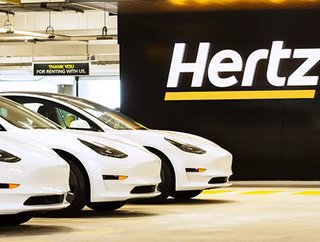How the Tesla-Hertz deal is a transport 'win win'

You can't keep Tesla out of the news for long.
Following its recent trading update, in which it announced a record $1.61 billion net income, yesterday it was back in the media spotlight after announcing a major $4 billion deal with Hertz, which will buy 100,000 electric rental cars.
As Tesla's market capitalisation surpassed $1 trillion for the first time, it was understandable that it grabbed the limelight. But consider what this means for Hertz.
This is a company which, pre-COVID, had consistently been popular with leisure and business travellers the world over, but then found itself in a huge hole - which left it filing for Chapter 11 bankruptcy in May 2020.
The pandemic illustrated the fragility of their model when planes unexpectedly ground to a halt and people stopped travelling for work and holidays, though you could argue it shone a light on a more inherent challenge: namely, how to plan for a more sustainable fossil fuel-free future.
So this tie up, which will see 100,000 Teslas introduced by the end of 2022 with 20% of its global fleet set to go electric, is a big deal in more ways than one. For once the marketing - 'A new Hertz' - seems apt.
From a position of weakness, Hertz now believes it has a "competitive advantage", and while it won't be the only operator courting electric, having Tesla alongside it will certainly provide a new commercial dimension.
Hertz is no stranger to EV charging infrastructure, having introduced EVs to its rental fleet back in 2011 - but a decade on, it will now need to 'super charge' the roll out across global operations.
“Electric vehicles are now mainstream, and we’ve only just begun to see rising global demand and interest,” said Hertz interim CEO Mark Fields. “The new Hertz is going to lead the way as a mobility company, starting with the largest EV rental fleet in North America and a commitment to grow our EV fleet and provide the best rental and recharging experience for leisure and business customers around the world.”
From early November and expanding through year end, customers will be able to rent a Tesla Model 3 at Hertz airport and neighbourhood locations in US major markets and select cities in Europe.
Customers who rent a Tesla Model 3 will have access to 3,000 Tesla supercharging stations throughout the US and Europe, the company pledges.
Hertz will offer a premium and differentiated rental experience for the Tesla EVs. This includes digitized guidance to educate customers about the electric vehicle to get them on their way quickly, and coming soon, an expedited EV rental booking process through the Hertz mobile app.
With the current order, EVs will comprise more than 20 percent of Hertz global fleet and is expected to be supported by a combination of Level 2 and DC fast charging in approximately 65 markets by the end of 2022 and more than 100 markets by the end of 2023. Hertz said these ambitions could be affected by factors outside of Hertz's control, such as semiconductor chip shortages or other constraints.
For Tesla, the deal is commercial proof that EV adoption is now permeating all automotive sectors. It delivered a record 241,300 cars in Q3.
For publicity good measure, Hertz has also partnered with seven-time Super Bowl champion and entrepreneur Tom Brady to showcase how it is making EV rentals "fast, seamless and more accessible".
Another change sees Tim Langley-Hawthorne join the company as Executive Vice President and Chief Information Officer, overseeing global technology strategy, and technology infrastructure modernisation.
"As we create the new Hertz, we're investing in the technology that will enable a best-in-class, digital-first customer experience," added Fields.
After one of the most tumultuous periods in its history, Hertz will feel its corporate wheels are back in motion again.
EV updates
- Valvoline recently launched XEV, the brand's first China-based release of hybrid, plug-in hybrid and pure EV products. The announcement was made in conjunction with Shanghai-based car maintenance service provider, Tuhu, who will provide services using Valvoline XEV products.
- Navistar, the manufacturer of International brand commercial trucks and engines and IC Bus brand buses, and In-Charge Energy, a turnkey charging solution for commercial fleets, have leveraged their partnership to power EV fleet customers with carbon neutral electricity through their EV charging infrastructure.
- Canoo has reached an agreement with Panasonic to supply batteries for its Lifestyle Vehicle. Scheduled for production in Q4 2022, the vehicle will be manufactured by VDL Nedcar and will support US and EU product demand.
- EVs represented almost 5% of all new car sales in 2020, forecast to reach over 7% of new car sales worldwide in 2021 and will represent 48% of all new sales by 2030, according to ResearchAndMarkets.com






